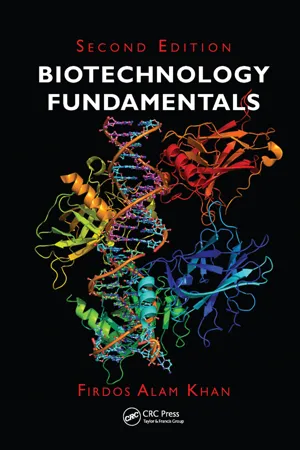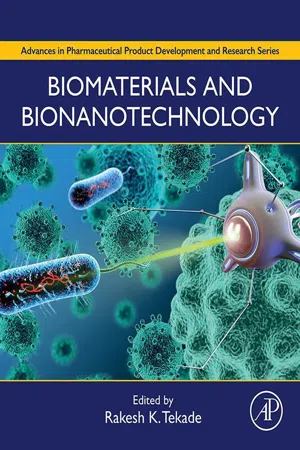Biotechnology
Biotechnology involves the use of biological systems, organisms, or derivatives to develop products and technologies that benefit society. It encompasses a wide range of applications, including genetic engineering, pharmaceuticals, agriculture, and environmental management. By harnessing the power of living organisms, biotechnology has the potential to address various challenges and improve human well-being.
5 Key excerpts on "Biotechnology"
- eBook - ePub
- Firdos Alam Khan(Author)
- 2020(Publication Date)
- CRC Press(Publisher)
...Biotechnology includes recombinant DNA (deoxyribonucleic acid) techniques (genetic engineering) and hybridoma technology. A set of biological techniques developed through basic research and applied to research and product development. The use of cellular and biomolecular processes to solve problems or make useful products. An industrial process that involves the use of biological systems to make monoclonal antibodies and genetically engineered recombinant proteins. Development of 3D organs or tissues under in vitro conditions We should not debate on which of the given definitions is true because all of them are true in their respective ways. For example, if you ask a farmer about what Biotechnology is, he or she may say, “Biotechnology is to produce high yield or pest-resistant crops.” If you pose the same question to a doctor, he or she may say, “Biotechnology is about making new vaccines and antibiotics.” If you ask the question to an engineer, he or she may say, “Biotechnology is about designing new diagnostic tools for better understanding of human diseases,” and if you ask the question to a patient suffering from Parkinson’s disease, he or she may say “Biotechnology is about stem-cell-based therapy and has tremendous capability to cure Parkinson’s disease.” All of these different definitions of Biotechnology suggest that Biotechnology has immensely impacted our daily life with arrays of products. As the field of Biotechnology keeps expanding, efforts are being made to subclassify this field into various types. The field of Biotechnology may be broadly subclassified into animal, plant, medical, industrial, and environmental Biotechnology. Nonetheless there are other emerging fields of Biotechnology, such as regenerative medicine (Figure 1.2), biosimilars, pharmacogenomics, bioinformatics, therapeutic proteins, forensic science, synthetic biology, bio-robotics, and biomimetics which we have separately discussed in Chapter 12...
- eBook - ePub
- Firdos Alam Khan(Author)
- 2018(Publication Date)
- CRC Press(Publisher)
...Biotechnology includes recombinant DNA techniques (genetic engineering) and hybridoma technology. • A set of biological techniques developed through basic research and applied to research and product development. • The use of cellular and biomolecular processes to solve problems or make useful products. • An industrial process that uses biological systems to make monoclonal antibodies and genetically engineered recombinant proteins. We should not debate on which of the given definitions is true because all of them are true in their respective ways. For example, if you ask a farmer what Biotechnology is, he or she may say “Biotechnology is to produce high-yield or pest-resistant crops.” If you pose the same question to a doctor, he or she may say “Biotechnology is about making new vaccines and antibiotics.” If you ask an engineer, he or she may say “biotechnol-ogy is about designing new diagnostic tools for better understanding of human diseases,” and if you ask a patient suffering from Parkinson’s disease, he or she may say “Biotechnology is about stem-cell-based therapy and has tremendous capability to cure Parkinson’s disease.” All these different definitions of Biotechnology suggest that Biotechnology has immensely influenced our daily life with arrays of products. As the field of Biotechnology keeps expanding, efforts are being made to subclassify this field into various types. The field of Biotechnology may be broadly sub-classified into animal, agricultural, medical, industrial, and environmental Biotechnology. 1.2 Animal Biotechnology Animal Biotechnology is the application of scientific and engineering principles to the processing or production of materials from animals or aquatic species to provide research models and to make healthy products...
- eBook - ePub
- Kirsi-Marja Oksman-Caldentey, Wolfgang H. Barz, Kirsi-Marja Oksman-Caldentey, Wolfgang H. Barz(Authors)
- 2002(Publication Date)
- CRC Press(Publisher)
...1 Plant Biotechnology—An Emerging Field Wolfgang H.Barz Institute of Plant Biochemistry and Biotechnology, Westphalian Wilhelm’s University Munich, Munich, Germany Kirsi-Marja Oksman-Caldentey VTT Biotechnology, VTT Technical Research Center of Finland, Espoo, Finland I. INTRODUCTION Biotechnology is a scientific discipline with focus on the exploitation of metabolic properties of living organisms for the production of valuable products of a very different structural and organizational level for the benefit of men. The products can be the organisms themselves (i.e., biomass or parts of the organismic body), products of cellular or organismic metabolism (i.e., enzymes, metabolites), or products formed from endogenous or exogenous substrates with the help of single enzymes or complex metabolic routes. The organisms under question vary from microbes (bacteria, fungi) to animals and plants. In addition to intact organisms, isolated cells or enzyme preparations are employed in Biotechnology. The possibility to submit the producing organisms or the cellular systems to technical and even industrial procedures has led to highly productive processes. The products of Biotechnology are of importance for medicine, pharmaceutical sciences, agriculture, food production, chemistry, and numerous other disciplines. Biotechnology receives the necessary scientific and technical information from a considerable number of disciplines. Cell biology, morphology of the employed organisms, biochemistry, physiology, genetics, and various technical fields are major sources. In the last two decades, molecular biology and gene technology have substantially contributed to the spectrum of scientific disciplines forming Biotechnology...
- eBook - ePub
- (Author)
- 2019(Publication Date)
- Academic Press(Publisher)
...For example, it has been questioned whether acts such as the insertion of genes from one organism into a different one are ethical and should be allowed. Another huge concern regarding Biotechnology-based therapy is about gene therapy, which involves genetic engineering of humans. Although the main goal of gene therapy is to treat human diseases through genetic modifications, there is a possibility of misusing it to change or modulate other human traits (Polkinghorne, 2000 ; Powers, 2004). Patency in Biotechnology research is considered as one of the major aspects of ethical concern. Patency of naturally occurring products is not allowed, there must be enough human intervention on the product to allow it to be patented. However, the extent of the required human intervention to allow the product to be patented is difficult to be clearly defined. For example, it is difficult to draw clear boundaries on whether things such as genetically modified organisms or DNA sequences can be patented as human products (Resink, 2012). Thus the research in Biotechnology is being continuously ethically questioned and various fears have been raised regarding the possible misuses of this field. 5.5 Biotechnology-Based Products: Processing, Production, and Application Perspectives As previously mentioned, there are various classes of Biotechnology-based products that are produced for the treatment or prevention of different pathological conditions. In the following sections, various classes of Biotechnology-based products are discussed along with their production process and therapeutic applications. 5.5.1 Antibiotics Antibiotics are molecules that have the ability to inhibit the growth or killing of microorganisms. Various antibiotics have been discovered that can be used against a wide range of pathogenic microorganisms such as bacteria and fungi (Clardy et al., 2009). Therefore large-scale production of antibiotics is an important part of Biotechnology-based products...
- eBook - ePub
Biosafety and Bioethics in Biotechnology
Policy, Advocacy, and Capacity Building
- Sylvia Uzochukwu, Nwadiuto (Diuto) Esiobu, Arinze Stanley Okoli, Emeka Godfrey Nwoba, Ezebuiro Nwagbo Christpeace, Charles Oluwaseun Adetunji, Abdulrazak B. Ibrahim, Benjamin Ewa Ubi, Sylvia Uzochukwu, Nwadiuto (Diuto) Esiobu, Arinze Stanley Okoli, Emeka Godfrey Nwoba, Ezebuiro Nwagbo Christpeace, Charles Oluwaseun Adetunji, Abdulrazak B. Ibrahim, Benjamin Ewa Ubi(Authors)
- 2022(Publication Date)
- CRC Press(Publisher)
...The authors highlighted issues like funding, clinical trials of new implants, drugs or devices, human or animal experimentation and conflicts of interest. Therefore, biomedical engineers must uphold the highest standards of professionalism in their practice and as technological advancement move to the next generation, every biomedical scientist must sort out the bioethical issues in bringing the technology to the table. Pamela Andanda (2009) showed that in Africa where agricultural sector contributes to the major economic value chain, Biotechnology in relation to pharmaceuticals and industrial sector is still in their early stage of development, but agricultural sector has shown tremendous progress; therefore, effort is being put in place for its regulation and adoption. Andanda (2006) evaluated the efforts made so far to develop a legal framework for genetically modified organisms by Kenya and South Africa. They discovered that a holistic approach should be adopted to handle many controversies in genetically modified organisms in order to gain public trust and maintain bioethical practice. 5.4 Dealing with Ethical Issues Arising from Integrated Technologies Ethical issues around biotechnological developments will remain a source of intense argument between the scientific community, government, manufacturers and the general public. Ethical concerns or reflections have helped shape the guidelines for biotechnological advancement such that it can be accepted in the society due to deep consideration for human dignity, ecosystem interference, etc. (Rosie, 2004). Genetic manipulation in plants and animals as a result of Biotechnology are major sources of ethical argument for some decades now in the medical and agricultural practice...




